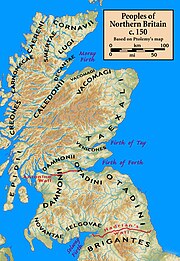
The Lugi were a people of ancient Britain, known only from a single mention of them by the geographer Ptolemy c. 150. from his general description and the approximate locations of their neighbors their territory was along the western coast of the Moray Firth. Ptolemy does not provide them with a town or principal place.
Etymology
The Pictish name Lugi probably stems from Proto-Celtic *lugos ('crow'). A derivation from the Celtic god Lug has also been proposed.
See also
References
- Sergent, Bernard (1991). "Ethnozoonymes indo-européens". Dialogues d'histoire ancienne. 17 (2): 12. doi:10.3406/dha.1991.1932.
- Abad, Rubén Abad. (2008). "La divinidad celeste/solar en el panteón céltico peninsular". In: Espacio, Tiempo y Forma. Serie II, Historia Antigua, 21: 101.
- Bibliography
- Ptolemy (150), Thayer, Bill (ed.), Geographia, Book 2, Chapter 2: Albion island of Britannia, LacusCurtius website at the University of Chicago (published 2008), retrieved 26 April 2008
| Scotland during the Roman Empire | |||||||||||
|---|---|---|---|---|---|---|---|---|---|---|---|
| Scotland in the Iron Age | |||||||||||
| Caledonian and Pictish tribes | |||||||||||
| Battles and campaigns | |||||||||||
| Caledonian fortifications | |||||||||||
| Caledonians & Picts | |||||||||||
| Roman fortifications |
| ||||||||||
| Other structures & artefacts | |||||||||||
| Roman commanders | |||||||||||